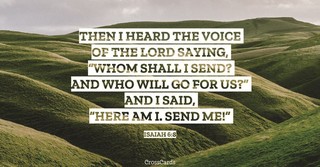
Change Translation
- Recent Translations
- All Translations
Isaiah 6:1
Share
Listen to Isaiah 6:1
Settings
Scripture Text Size
1
In the year that King Uzziah died, I saw the Lord sitting on a throne, high and lofty; and the hem of his robe filled the temple.
Isaiah 6:1 Meaning and Commentary
Isaiah 6:1
not God essentially considered, whose essence is not to be seen; but personally, Father, Son, and Spirit, for all the three Persons appear in this vision, ( Isaiah 6:3 Isaiah 6:8 ) particularly Christ, as, is clear from ( John 12:41 ) who is the "Adonai", or Lord; he is Lord of all, of all men, even of the greatest among them, and of all the angels in heaven, and of the church of God, by his Father's gift, by his own purchase, in right of marriage, and through the conquest of his grace. This sight was not corporeal, but with the eyes of the understanding, in the vision of prophecy; and to have a sight of Christ as the Lord, and especially as our Lord, is very delightful and comfortable; for though he is a sovereign Lord, he is no tyrannical one, is very powerful to protect and defend, and has all fulness for supply; and particularly as "sitting upon a throne" as a king, for he having done his work as a priest, sits down on his throne as a king; and a lovely sight it is to see him enthroned at the right hand of the Majesty on high; and therefore is said to be "high and lifted up"; for this is to be understood not of his throne, as if that was high and lifted up in the highest heavens, as the Targum paraphrases it; but of himself, who is high and exalted above all creatures, as Aben Ezra observes; and this sense the accents determine for: the vision refers to the exaltation of Christ, after his humiliation here on earth; and to behold him crowned with glory and honour is very delightful, since he is exalted as our head and representative in our nature, and acts for us in this his exalted state; and we may be assured of being exalted also. It follows, and his train filled the temple;
either the material temple visionally seen, where his feet were, and his throne in heaven, as Jarchi interprets it; or heaven, as Kimchi, which is the Lord's holy temple, where his throne is, ( Psalms 11:4 ) or rather the human nature of Christ, the temple where the fulness of the Godhead dwells bodily, and which the train of divine perfections fill; though it may be best of all to understand it of the church, the temple of the living God; and "his train" may denote the effects of Christ's kingly and priestly offices, with which the Church was filled upon his exaltation; as the gifts and graces of his Spirit in an extraordinary manner on the day of Pentecost, and since in a more ordinary way; whereby men have been made ministers of the New Testament, and churches filled with them, and these made useful in filling the churches with members. The Targum is,
FOOTNOTES:
F12 Epist. Damaso, tom. 3. fol. 37. K.
In the year that King Uzziah died
Which was the fifty second year of his reign, and in the year 3246 from the creation of the world; and, according to Jerom F12, was the year in which Romulus, the founder of the Roman empire, was born: some understand this not of his proper death, but of his being stricken with leprosy, upon his attempt to burn incense in the temple; upon which he was shut up in a separate house, which was a kind of a civil death: so the Targum,
``in the year in which King Uzziah was smitten;''that is, with leprosy; and so Jarchi and others interpret it, from the ancient writers; but the first sense is the best. Some, as Aben Ezra, would have this to be the beginning of the prophecy of Isaiah, because of the mission of the prophet in it; but others rightly observe, that this mission respects not the prophecy in general, but the particular reproof the prophet was sent to give to the Jews herein mentioned. The title of this chapter, in the Arabic version, is remarkable; according to which, this chapter contains the vision which Isaiah, the son of Amos, saw three years, or, as others affirm, thirty years, after prophecy was taken from him. He had prophesied about ten years before this, in the reign of Uzziah; and only this vision was in the reign of Jotham; the next prophecy was delivered out in the reign of Ahaz, ( Isaiah 7:1 ) and others in the time of Hezekiah; and the date of this vision is only mentioned, to observe the order of the visions, agreeably to ( Isaiah 1:1 ) and moreover it may be observed from hence, that kings must die as well as others; but the King of kings ever lives, he is the living God, and the everlasting King, as follows: I saw also the Lord sitting upon a throne, high and lifted up;
not God essentially considered, whose essence is not to be seen; but personally, Father, Son, and Spirit, for all the three Persons appear in this vision, ( Isaiah 6:3 Isaiah 6:8 ) particularly Christ, as, is clear from ( John 12:41 ) who is the "Adonai", or Lord; he is Lord of all, of all men, even of the greatest among them, and of all the angels in heaven, and of the church of God, by his Father's gift, by his own purchase, in right of marriage, and through the conquest of his grace. This sight was not corporeal, but with the eyes of the understanding, in the vision of prophecy; and to have a sight of Christ as the Lord, and especially as our Lord, is very delightful and comfortable; for though he is a sovereign Lord, he is no tyrannical one, is very powerful to protect and defend, and has all fulness for supply; and particularly as "sitting upon a throne" as a king, for he having done his work as a priest, sits down on his throne as a king; and a lovely sight it is to see him enthroned at the right hand of the Majesty on high; and therefore is said to be "high and lifted up"; for this is to be understood not of his throne, as if that was high and lifted up in the highest heavens, as the Targum paraphrases it; but of himself, who is high and exalted above all creatures, as Aben Ezra observes; and this sense the accents determine for: the vision refers to the exaltation of Christ, after his humiliation here on earth; and to behold him crowned with glory and honour is very delightful, since he is exalted as our head and representative in our nature, and acts for us in this his exalted state; and we may be assured of being exalted also. It follows, and his train filled the temple;
either the material temple visionally seen, where his feet were, and his throne in heaven, as Jarchi interprets it; or heaven, as Kimchi, which is the Lord's holy temple, where his throne is, ( Psalms 11:4 ) or rather the human nature of Christ, the temple where the fulness of the Godhead dwells bodily, and which the train of divine perfections fill; though it may be best of all to understand it of the church, the temple of the living God; and "his train" may denote the effects of Christ's kingly and priestly offices, with which the Church was filled upon his exaltation; as the gifts and graces of his Spirit in an extraordinary manner on the day of Pentecost, and since in a more ordinary way; whereby men have been made ministers of the New Testament, and churches filled with them, and these made useful in filling the churches with members. The Targum is,
``and the temple was filled with the splendour of his glory;''the "train" is the skirts, borders, or lower parts of the garments, in allusion to those of a king, or rather of the high priest, a type of Christ.
F12 Epist. Damaso, tom. 3. fol. 37. K.
Taken from John Gill's Exposition of the Bible
Unlock Deeper Insights: Get Over 20 Commentaries with Plus! Subscribe Now
Isaiah 6:1 In-Context
1
In the year that King Uzziah died, I saw the Lord sitting on a throne, high and lofty; and the hem of his robe filled the temple.
2
Seraphs were in attendance above him; each had six wings: with two they covered their faces, and with two they covered their feet, and with two they flew.
3
And one called to another and said: "Holy, holy, holy is the Lord of hosts; the whole earth is full of his glory."
4
The pivots on the thresholds shook at the voices of those who called, and the house filled with smoke.
5
And I said: "Woe is me! I am lost, for I am a man of unclean lips, and I live among a people of unclean lips; yet my eyes have seen the King, the Lord of hosts!"
New Revised Standard Version Bible, copyright 1989, Division of Christian Education of the National Council of the Churches of Christ in the United States of America. Used by permission. All rights reserved.
